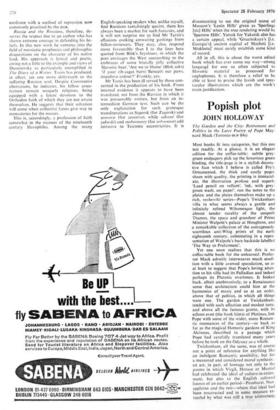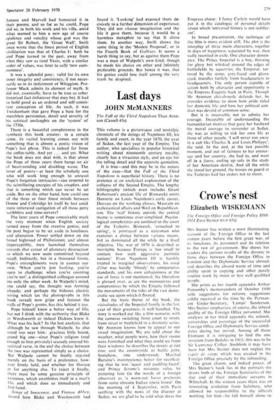Popish plot
JOHN HOLLOWAY
The Garden and the City: Retirement and Politics in the Later Poetry of Pope May- nard Mack (Toronto OUP 84s) Most books fit into categories, but this one not readily. At a glance, it is an elegant edition for the coffee-table: subtle grey- green endpapers pick up the luxurious green binding, the title-page is in a stylish decora- tive face which I believe is called Fry's Ornamented, the thick and costly pages sheen with quality, the printing is immacul- ate, the illustration profuse and superb. `Lead pencil on vellum', 'ink, with grey- green wash, on paper', run the notes to the plates; and the plates themselves make up a rich, recherché series—Pope's Twickenham villa in what seems always a gentle and infinitely refined Wilsonesque light, the almost tender rurality of the unspoilt Thames, the space and grandeur of Prime Minister Walpole's palace at Houghton, and a remarkable collection of the outrageously scurrilous anti-Whig prints of the early eighteenth century, culminating in a repre- sentation of Walpole's bare backside labelled `The Way to Preferment'.
Yet one soon realises that this is no coffee-table book for the unlearned. Profes- sor Mack adroitly interweaves much erudi- tion with a little avowed speculation, so as at least to suggest that Pope's loving atten- tion to his villa had its Palladian and indeed perhaps its Platonic overtones. It looked back, albeit unobtrusively, to a Renaissance sense that architecture could hint at the harmonies of music and so at an order, above that of politics, in which all things were one. The garden at Twickenham, tended with such affection and modest taste. and above all the famous grotto, with its echoes even (the book hints) of Plotinus, link Pope with some of the wider, more Roman- tic resonances of the century—or back as far as the magical Homeric gardens of King Alcinous, described in a passage which Pope had carefully translated many years before he took on the Odyssey as a whole. Twickenham, all the same, was of course not a point of reference for anything like an indulgent Romantic sensibility, but for a measured and considered moral synthesis: an act, in part, of homage not only to the poems in which Virgil, Horace or Martial had celebrated the ideal of culture-in-retire- ment, but also to the English cultured houses of an earlier period—Penshurst, Nun- appleton and the rest—where that ideal had been resurrected and in some measure ex- tended by what was still a true aristocracy,
Jonson and Marvell had honoured it in their poems; and so far as he could, Pope did so, in both his work and his villa, amid what seemed to him a new age of coarse opulence and venality whose god was the great Sir Robert, the 'Great Wall'. Swift once wrote that the finest period of English civilisation was that of Charles I: both he and Pope turned to the past, away from what they saw as (and Yeats, with a similar order of values, was later to call) 'new com- monness'.
It was a splendid pose: valid for its own inner integrity and consistency, if not neces- sarily so in its indictment of Whiggism. Pro- fessor Mack admits its element of myth. It did not, essentially, have to be true as sober historical fact (whatever that may be). It had to hold good as an ordered and self-consis- tent conception of life. As such, it was Twickenham that gave Pope a base for the matchless persistence, detail and severity of his satirical onslaughts on the 'system' of the 1730s.
There is a beautiful completeness in the synthesis this book creates: in a certain sense, its varied learning comes out with something that is almost a poetic vision of Pope's last phase. This is indeed far from the coffee-table. And yet . . . and yet. What the book does not deal with, is that about the Pope of these years there hangs an air of heart-rending and disabling waste. The lover of poetry—at least the scholarly one who will work long enough to unravel Pope's forgotten intricacies—can respond to the scintillating energies of his couplets, and that is something which can never be set aside. But on the other hand, how could one of the three or four finest minds between Donne and Coleridge let itself be lost amid mere reiterated castigation of all those petty scribblers and time-servers?
The later years of Pope conceivably mark the very moment when English society turned away from the creative genius, and the poet began to be set aside in loneliness and alienation. Power settled down on the broad highroad of Philistinism; and almost imperceptibly, men launched themselves towards that career of planetary destruction to which we now seem committed beyond recall. Indirectly, but in a thousand forms, Pope's entanglements were in essence our own. 'When you're just looking, you're open to challenge; when you're counting you're not', a distinguished colleague assured me only the other week. In Walpole's mind, one could say, the thought was forming already; and perhaps the hideous electric wiring which (as the photographs in this book reveal) now gripe and festoon the walls of Pope's grotto, has this behind it too.
Pope himself knew a better way of life; but not I think with the authority that Blake or Wordsworth or indeed Dickens knew it. What was his lack? In the last analysis, that although he saw through Walpole, he also stood too near him: gracious little house, grand big one—since Pope's religion (real enough to him privately) scarcely entered his satirical verse, in the end the choice between the two was represented simply as a choice. But Walpole cannot be finally rejected merely on the basis of a preference, how- ever firmly held, and whether for Horace or for anything else. To reject it finally, there must be some genuine principle of existence, which establishes itself in a man's life, and which does so immediately and first-hand.
Songs of Innocence, and Tintern Abbey, record how Blake and Wordsworth had found it. 'Looking' had exposed them de- cisively to a further dimension of experience. They did not choose imagination and the life it gave them, because it would be a harmless metaphor to say that It chose them. In another way, Swift shows the same thing in the 'Modest Proposal', or in the Fourth Book of Gulliver. It seems a harsh thing to say, but as against them Pope was a man of Walpole's own kind; though he made his choice on other and infinitely preferable. grounds. But hence it was, that his genius could lose itself among the very trash he despised.



































 Previous page
Previous page